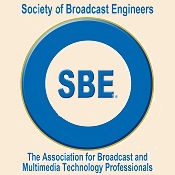
|

CHAPTER 24, Inc., MADISON, WI
|
|
Monthly eNews
|
January 2021
|
Our Next Meeting:
Thursday, January 28th
FM, LPTV, SFN Broadcast Antennas
by Kathrein Broadcast USA
This presentation will be on the line of broadcast antennas from Scala, Kathrein, and Sira. These will include FM low and high power antennas and their FM combiner line and filter line. On the TV side they will show their plug and play options for LPTV and SFN products.
7:00 PM - Meeting/Program
This meeting is Virtual
Connection information will be distributed
in the days just prior to the meeting.
Last Meeting's Minutes
The Chapter's December Holiday Dinner had to be canceled due to COVID.
Program Ideas Appreciated
The Chapter 24 meeting schedule is available here. Is there a topic you would like to see covered at one of our local Chapter 24 meetings? Or, better yet, is there a topic that you'd like to speak on at an upcoming meeting? Please forward any ideas to Britny Williams or to one of the Chapter 24 officers for consideration. Open dates are available.
Amateur Radio News
Compiled by Tom Weeden, WJ9H
FCC Reduces Proposed Amateur Radio Application Fee to $35
The FCC has agreed with ARRL and other commenters that its proposed $50 fee for certain amateur radio applications was "too high to account for the minimal staff involvement in these applications." In a Report and Order (R&O), released on December 29, the FCC scaled back to $35 the fee for a new license application, a special temporary authority (STA) request, a rule waiver request, a license renewal application, and a vanity call sign application. All fees are per application. There will be no fee for administrative updates, such as a change of mailing or email address.
This fall, ARRL filed comments in firm opposition to the FCC proposal to impose a $50 fee on amateur radio license and application fees and urged its members to follow suit.
As the FCC noted in its R&O, although some commenters supported the proposed $50 fee as reasonable and fair, "ARRL and many individual commenters argued that there was no cost-based justification for application fees in the Amateur Radio Service." The fee proposal was contained in a Notice of Proposed Rulemaking (NPRM) in MD Docket 20-270, which was adopted to implement portions of the "Repack Airwaves Yielding Better Access for Users of Modern Services Act" of 2018 - the so-called "Ray Baum's Act."
The FCC said it received more than 197,000 personal license applications in 2019, which includes not only ham radio license applications but commercial radio operator licenses and General Mobile Radio Service (GMRS) licenses.
The Act requires that the FCC switch from a Congressionally-mandated fee structure to a cost-based system of assessment. The FCC proposed application fees for a broad range of services that use the FCC's Universal Licensing System (ULS), including the Amateur Radio Service, which had been excluded previously. The 2018 statute excludes the Amateur Service from annual regulatory fees, but not from application fees.
SKYWARN Day a Success
Judging by the list of more than 700 registered participants, SKYWARN Recognition Day (SRD) on December 5 was a success. Cosponsored by ARRL and the National Weather Service (NWS), SRD recognizes radio amateurs for the vital public service they provide during severe weather. Participants ranged from NWS offices, radio amateurs, non-amateur radio spotters, and non-SKYWARN spotters. Radio amateurs -- the first SKYWARN volunteers -- comprise a large percentage of SKYWARN volunteers across the country, providing vital communication between the NWS and emergency management in the event that telecommunication systems are knocked out.
The NWS Milwaukee Forecast Office reported more than 150 contacts logged across 35 states.
Given the COVID-19 pandemic, SRD was handled a little differently than in the past. Normally, radio amateurs participate from their home stations and from stations at NWS forecast offices, with the goal of contacting as many NWS forecast offices as possible. This year, participation from NWS forecast offices was minimal, and the focus shifted to contacting as many SKYWARN trained spotters as possible. New this year, SRD was opened to all SKYWARN spotters, and a SKYWARN Recognition Day Facebook page was created, hosting a variety of live and recorded segments throughout the day.
(Excerpts from the American Radio Relay League's arrl.org web site)
FCC NEWS
compiled by Tom Smith
No Reserved Channel
On December 8, 2020, the FCC issued a Report and Order (FCC-20-175A1) that declined to adopt a proposed rulemaking from 2015 that would have reserved a channel in the UHF TV band for wireless microphones and TV white space devices in every market. The FCC decided that because of the recent rule changes for white space devices that allowed for greater antenna height and power in rural areas and past rule changes for wireless microphones that opened some spectrum outside of the broadcast TV bands, reserving a UHF channel was no longer required. The FCC also noted that there were a number of markets where a vacant UHF channel was no longer available. It was noted that the number of stations occupying a channel went from an average of 46 per channel to 68 per channel in the UHF band. That increase of full power and Class A stations plus all of the LPTV and translator stations that need to be repacked into the UHF band would leave little space for new assignments or the upgrading of existing stations. The Commission also stated that it would be in the public interest to allow for a robust TV service particularly in rural areas with limited choices in multi program video distributers such as cable and limited broadband providers. They also didn't want to limit any future ATSC 3.0 services.
Rules Promote New ATSC 3.0 Services
On December 10, 2020, the FCC issued rules (FCC-20-181A1) to help promote new services for TV stations that adopt the new ATSC 3.0 service. The services could be subscription data or video services. For commercial stations, the FCC will collect a 5% fee from the station on any subscription service and a 2.5% fee for non-commercial stations. Non-Commercial stations will be limited to non-profit type services which would most likely be distance education services. Services that would be available to and limited to donors as a bonus service would be treated like tote bags and other gifts and would be exempt from the fee. Commercial TV stations will only be required to pay the FCC a fee for the amount they actually collect for non-free broadcast use of their spectrum bandwidth. If they lease bandwidth to a third party, the FCC fee will be based on the amount they get for the lease and not on the gross income that is collected by the service that is leasing the bandwidth. The new rules will also allow for competing stations in the market to lease bandwidth on other stations spectrum. That could allow a station or a group of stations to gather enough bandwidth to create either a pay TV, streaming, or data service.
The FCC declined to adopt a number of proposed rules concerning LPTV such as including equalizing interference rules to that of full power and class A stations, creating a path for LPTV stations to obtain primary status, changes to distributed distribution rules (SFN) and the lifting to some other restrictions.
FCC Seeks More Broadcast Spectrum For Wireless
The FCC issued a fact sheet (DOC-368984A1) on a proposed rulemaking on the use of broadcast spectrum for shared use for terrestrial flexible use including mobile. This time the FCC is seeking spectrum not from radio and broadcast TV use, but from broadcast satellite use in the 12.2 to 12.7 GHZ band. Besides broadcast satellite use, the FCC has currently authorized the band to be used by fixed satellite non-stationary orbit systems and terrestrial fixed service multi-video program services. The FCC refused to authorize a terrestrial multi-video program service a number of years ago where the transmitter sites would be placed north of the service area using a directional antenna pointed south in order to prevent interference to satellite reception. So the customers antennas would be pointed north which would be opposite of the antennas aimed for satellite services which point in a southerly direction.
In the fact sheet the FCC listed subjects that they wish to seek comment on. Specifically, the NPRM, if adopted, would seek comment on:
* Whether to add a mobile service allocation throughout the 12 GHz band
* Technical parameters that would allow for additional terrestrial shared use of the band without causing harmful interference to incumbent operators
*Possible methods for assigning flexible-use rights in the band, including:
* Modifying the licenses of existing MVDDS licensees to grant them flexible-use rights
* Auctioning overlay licenses in the band, or
* Authorizing underlay use of the band
* Potential sharing mechanisms for the band, if coexistence among the co-primary services (i.e., DBS, NGSO FSS, MVDSS incumbents) and proposed flexible-use service is
technically feasible
* Whether the costs of accommodating new services in the band exceed the benefits and whether the Commission should therefore maintain the status quo for the 12 GHz band.
This proposed rulemaking is in response to a petition from the MVDDS 5G Coalition.
Pirates Landlords Beware
As part of an order (DA-20-1490A1) that the FCC adopted on December17, 2020 amending section 1.80 of the rules, they codified penalties under section 511 for the operation of unlicensed operations in the AM or FM band other than those low power transmissions allowed under Part 15 of the rules. The penalties can be up to $100,000 a day, up to a million dollars. The penalties include those who knowingly tolerate unlicensed or pirate operations on their property. This was further explained in a separate FCC public notice (DOC-368836A1). In the public notice, the FCC noted that many times, a landlord knew of the pirate operation on their property and overlooked it. The FCC can now penalize the owner of the building that the unlicensed station operates in, if the FCC can prove that the landlord knew of the operation. This is another tool the FCC has for shutting down unlicensed radio stations which is a major issue in many east coast and Florida markets. Many of these pirate radio stations operate like licensed commercial stations including selling ads and providing specialized programming to underserved audiences.
FM Geocasting Moves Forward
On November 20, 2020 the FCC adopted a Notice of Proposed Rulemaking (FCC-20-166A1) which was released on December 1, 2020 which asked for comment on FM GeoCasting. FM GeoCasting is a process of providing localized programming by using FM booster transmitters. Booster transmitters are used to fill-in a station's signal in difficult reception areas much the same as translator stations. These transmitters operate on the stations licensed frequency unlike a translator which operate on frequencies different than the main station. Their coverage cannot expand beyond the main transmitters protected coverage contour. This proposed rulemaking is the result of a petition by GeoBroadcast Solutions LLC. The proposed system would allow for limited programming to be broadcast on the booster transmitter that is different than the main transmitter. The petitioner is proposing that the alternate programming be limited to 5% of a broadcast hour or three minutes per hour. The FCC had a comment period on the original petition with comments both in favor and in opposition to the proposal. They decided that there was enough interest to proceed with a Notice of Proposed Rulemaking.
The FCC is seeking comments on potential interference to the station's signal and possibly other stations signals, limits on the number of boosters stations can have and on the power limits for boosters that transmit alterative programming, interference complaints and notification of start of operation with possible interference announcements, and public service issues including possible loss of coverage to underserved populations.
There will be a 30 day comment period followed by a 30 day reply period.
For the Record
(Wisconsin FCC Actions Granted)
compiled by Leonard Charles
from the FCC Daily Digest
12/07/2020
Northland College
DWRNC-LP, 97.7 Mhz, Ashland, WI
License to cover
|
12/08/2020
J.Kinlow & A.Kinlow-Glosson,
Co-Special Admins, J.Kinlow EST
WGLB, 1560 Khz, Elm Grove, WI
W241CI, 96.1 Mhz, Milwaukee, WI
Voluntary Assignment of License
From: J.Kinlow & A.Kinlow-Glosson,
Co-Special Admins, J.Kinlow EST
To: JJK Media, LLC
|
12/08/2020
Relevant Radio, INC.
WSJP, 1640 Khz, Sussex, WI
License to modify
|
12/14/2020
Flambeau Broadcasting Co., INC.
WLDY, 1340 Khz, Ladysmith, WI
WJBL, 93.1 Mhz, Ladysmith, WI
Voluntary Assignment of License
From: Flambeau Broadcasting Co., INC.
To: Zoe Communications INC
|
12/18/2020
ION Television License, LLC
WPXE-TV, Chan-30, Kenosha, WI
WTPX-TV, Chan-19, Antigo, WI
Voluntary Transfer of Control, amended
From: Media Holdco, LP
To: Scripps Media, INC.
|
Certification and Education
compiled by Jim Hermanson
The Open Exam Schedule
| Exam Dates |
Location |
Application Deadline
(to SBE National Office) |
June 4-14, 2021
|
Local Chapters (Madison Area)
|
April 16, 2021
|
August 6-16, 2021
|
Local Chapters (Madison Area)
|
June 11, 2021
|
November 5-15, 2021
|
Local Chapters (Madison Area)
|
September 10, 2021
|
Each year, account balance permitting, Chapter 24 will reimburse half the application fee to any member of Chapter 24 in good standing who successfully obtains any SBE certification level not previously held by that member. Contact the SBE Chapter 24 chairperson or certification chairperson for more information.
When you are ready to take an SBE exam, note the open exam schedule, complete the appropriate application (found here... http://www.sbe.org/applications) and send it directly to the SBE National office (see address below) with the respective fee. You will be notified once your application is approved. Your local certification chairman will receive a list of applicants and exams in his/her chapter and arrange for a proctor. He/she will then contact applicants to schedule a mutually agreeable date, time, and place for the exam(s) within the respective exam date window. This must be coordinated before the exam will be sent by SBE National. Completed exam(s) will be mailed back to SBE National for grading. Pass/fail results will be mailed directly to the applicants within approximately six weeks.
The majority of SBE certifications are open book and access to the Internet is allowed to give a more "real world" situation.
You may mail, email or fax your applications to:
Megan E. Clappe
Certification Director
9102 N. Meridian St.
Suite 150
Indianapolis, IN 46260
317-846-9120 Fax
mclappe@sbe.org
|
ATSC3 Specialist Certification Now Available
The Society of Broadcast Engineers, in its continuing effort to advance its Program of Certification, has added a new Specialist Certification to its offerings: The ATSC3 Specialist. In addition to various certification levels that require a certain time of professional career experience and cover a broad knowledge base, the SBE offers several Specialist Certifications, each one focusing on a specific understanding of a technology. The SBE began its program of certification in 1975.
The new level of certification was developed by the Society of Broadcast Engineers Certification Committee, chaired by Ralph Hogan, CPBE, DRB, CBNE, with direct assistance from the Advanced Television Systems Committee. The first ATSC3 SBE Certification exams are made available during the February 2021 SBE exam period. The initial idea to create the SBE ATSC3 Specialist Certification began in 2018. The SBE Certification Committee worked closely with key ATSC members for input on suitable information to include in the exam. The Certification Committee also worked with several SBE members with direct experience installing ATSC 3.0 systems. From this, a set of questions was created, beta tests were conducted, the questions were reviewed and adjusted and additional beta testing was held. The final question pool covers a mix of practical application and technology standards.
"The SBE is grateful to the ATSC for its help in assembling the exam question pool," said SBE Certification Chair Ralph Hogan. "As is the practice in creating any level of SBE Certification, a group of subject matter experts is consulted."
"I also extend my thanks to the ATSC members who helped in the exam development process. As the foremost experts on ATSC 3.0, their contributions were invaluable. I was also continually impressed by the SBE's methodical exam development process, ensuring that the exam would fairly and accurately assess a candidate's understanding of ATSC 3.0. Individuals who successfully pass the exam will have earned a truly meaningful certificate," added Madeleine Noland, president of ATSC.
Like all SBE Certifications, the exam questions will continue an ongoing review process to ensure the information being covered is relevant and current. Certifications are valid for five years, and then must be renewed or advanced to a higher level.
On the announcement, SBE President Wayne Pecena, CPBE, 8-VSB, AMD, DRB, CBNE, said, "Certification is one of the foundation blocks of the SBE. Just as the 8-VSB and DRB Specialist Certifications covered new technologies when they were introduced, so does the ATSC3 Specialist Certification."
The first SBE Specialist Certification was offered in 2005. The existing Specialist Certifications are the 8-VSB Specialist (8-VSB), AM Directional Specialist (AMD) and Digital Radio Broadcast Specialist (DRB). To apply for a specialist certification, an individual must currently hold certification on the Broadcast Engineer, Senior Broadcast Engineer, Professional Broadcast Engineer or Broadcast Networking Engineer Certification level. Exams must be completed within three hours and consist of 50 multiple-choice questions (two points each) and one essay question (20 points maximum). Examinees are provided one essay question to answer. Exams are pass/fail, and a score of 84 is a passing grade.
SBE Rolls Out Training Program for New Broadcast/Media Engineers
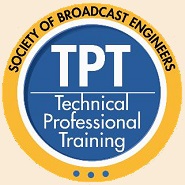 Utilizing a number of current SBE programs, the SBE is uniquely positioned to provide a valuable service to the broadcast industry: training new entrants to the field. Beginning January 1, 2021, the SBE will offer the SBE Technical Professional Training Program, an affordable and time sensitive way to train newer and entry level technical professionals at television and radio stations. The program includes:
Utilizing a number of current SBE programs, the SBE is uniquely positioned to provide a valuable service to the broadcast industry: training new entrants to the field. Beginning January 1, 2021, the SBE will offer the SBE Technical Professional Training Program, an affordable and time sensitive way to train newer and entry level technical professionals at television and radio stations. The program includes:
• SBE's extensive technical webinar offerings developed and cataloged for on-demand use that reflect the latest developments in the industry. The program includes SBE MemberPlus membership - access to all SBE webinars - more than 100.
• The SBE Engineering Handbook, published by McGraw Hill and SBE, is a hard copy reference volume for hands-on use in designing and maintaining technical facilities.
• The SBE Mentor Program - providing new entrants (mentees) to our profession with regular access and guidance from a seasoned professional.
• The SBE Certification Program entry-level certification, Certified Broadcast Technologist (CBT) exam, demonstrating a comprehension of technical and regulatory requirements of station operation.
• The SBE CertPreview (exam preparation) for the CBT certification, along with the mentor's knowledge and experience, in support of the TPT participant to help prepare for the CBT exam.
This program is designed to be deployable by group broadcasters, independent broadcasters and even state associations. Ideally, the mentor would come from within the ranks of the organization in which the mentee is employed. However, it can be performed by any qualified engineer willing to invest the time. SBE facilitates the establishment of the mentor-mentee relationship.
For more information contact Education Director Cathy Orosz at the SBE National Office.
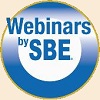
January Webinars
New SBE IP Networking Webinar Series Begins January 21
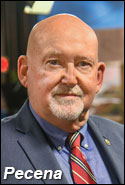 The New Year brings a new IP Networking webinar series from the SBE. The series instructor is Wayne Pecena, CPBE, 8-VSB, AMD, DRB, CBNE, assistant director of educational broadcast services in the Office of Information Technology at Texas A&M University. Pecena also serves as the current president of the SBE.
The New Year brings a new IP Networking webinar series from the SBE. The series instructor is Wayne Pecena, CPBE, 8-VSB, AMD, DRB, CBNE, assistant director of educational broadcast services in the Office of Information Technology at Texas A&M University. Pecena also serves as the current president of the SBE.
Part 1 of the new IP Networking webinar series, Network Topology, will be presented at 2:00 p.m. EST on January 21. Part 2, A Focus on Ethernet Switching, takes place on February 25 at 2:00 p.m. EST. Part 3, A Focus on Everything Layer 3, will be March 25 at 2:00 p.m. EST.
Completion of a webinar from Webinars by SBE qualifies for 1 credit, identified under Category I of the Recertification Schedule for SBE Certifications. Each webinar will be approximately 90 minutes in length.
The cost for SBE Members is $62. SBE members with the SBE MemberPlus option are FREE. Non-members fee is $92. Register here
SBE Webinar Jan. 28: MA3- All Digital AM - Things to Know
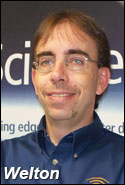 With the release of the Report and Order by the FCC on October 27, 2020, authorizing stations to use MA3 all-digital AM on their stations, several common questions -- and more than a few misunderstandings -- have arisen. In this webinar, Jeff Welton, CBRE, will discuss the research done to arrive at this point, the development history of HD Radio on AM and what the actual requirements will be going forward. He'll also look at some of the misunderstandings frequently encountered (for example, analog is going away?; is using MA3 required on the part of the station?).
With the release of the Report and Order by the FCC on October 27, 2020, authorizing stations to use MA3 all-digital AM on their stations, several common questions -- and more than a few misunderstandings -- have arisen. In this webinar, Jeff Welton, CBRE, will discuss the research done to arrive at this point, the development history of HD Radio on AM and what the actual requirements will be going forward. He'll also look at some of the misunderstandings frequently encountered (for example, analog is going away?; is using MA3 required on the part of the station?).
Welton has worked with Nautel for more than 30 years and is currently the sales manager for the U.S. Central Region. He was involved in the first all-digital field tests done by the NAB, has installed two dozen AM HD systems and has supported many others.
The completion of this SBE webinar qualifies for one credit, identified under Category 1 of the Recertification Schedule for SBE Certification.
SBE member price for the webinar is $62. It's FREE for SBE MemberPlus members. The non-member cost is $92. Register for the webinar online at the SBE website.
Completion of each of these SBE webinars qualifies for one credit, identified under Category I of the Recertification Schedule for SBE Certifications.
Several state-of-the-art radio, TV, multimedia, and IT engineering training is available through this page...
http://sbe.org/education/webinars-by-sbe/on-demand-webinars/
More information on SBE Education Programs is available here...
http://www.sbe.org/education/
Views expressed herein do not necessarily reflect the official position of the Society of Broadcast Engineers (SBE), its officers, or its members. SBE Chapter 24, Inc. regrets, but is not liable for, any omissions or errors. Articles of interest to Chapter 24 members are accepted up to the close of business the 1st day of each month. Send your article to lcharles@sbe.org.
|
 Utilizing a number of current SBE programs, the SBE is uniquely positioned to provide a valuable service to the broadcast industry: training new entrants to the field. Beginning January 1, 2021, the SBE will offer the SBE Technical Professional Training Program, an affordable and time sensitive way to train newer and entry level technical professionals at television and radio stations. The program includes:
Utilizing a number of current SBE programs, the SBE is uniquely positioned to provide a valuable service to the broadcast industry: training new entrants to the field. Beginning January 1, 2021, the SBE will offer the SBE Technical Professional Training Program, an affordable and time sensitive way to train newer and entry level technical professionals at television and radio stations. The program includes:

 The New Year brings a new IP Networking webinar series from the SBE. The series instructor is Wayne Pecena, CPBE, 8-VSB, AMD, DRB, CBNE, assistant director of educational broadcast services in the Office of Information Technology at Texas A&M University. Pecena also serves as the current president of the SBE.
The New Year brings a new IP Networking webinar series from the SBE. The series instructor is Wayne Pecena, CPBE, 8-VSB, AMD, DRB, CBNE, assistant director of educational broadcast services in the Office of Information Technology at Texas A&M University. Pecena also serves as the current president of the SBE.
 With the release of the Report and Order by the FCC on October 27, 2020, authorizing stations to use MA3 all-digital AM on their stations, several common questions -- and more than a few misunderstandings -- have arisen. In this webinar, Jeff Welton, CBRE, will discuss the research done to arrive at this point, the development history of HD Radio on AM and what the actual requirements will be going forward. He'll also look at some of the misunderstandings frequently encountered (for example, analog is going away?; is using MA3 required on the part of the station?).
With the release of the Report and Order by the FCC on October 27, 2020, authorizing stations to use MA3 all-digital AM on their stations, several common questions -- and more than a few misunderstandings -- have arisen. In this webinar, Jeff Welton, CBRE, will discuss the research done to arrive at this point, the development history of HD Radio on AM and what the actual requirements will be going forward. He'll also look at some of the misunderstandings frequently encountered (for example, analog is going away?; is using MA3 required on the part of the station?).

